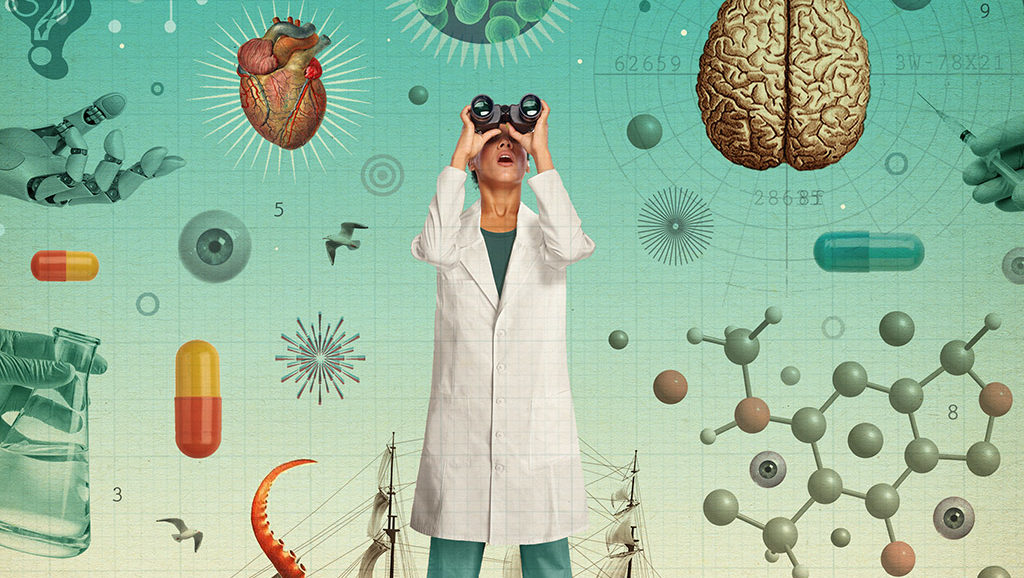Like many people, I learned about Dr. Frankenstein's monster through films that were either hilarious, dramatic or just plain silly, with the unnamed creature depicted as an illiterate brute in search of understanding. But those films, inspired by Mary Shelley's novel Frankenstein: The Modern Prometheus, barely address the story's most disturbing aspect: The doctor took no responsibility for the results of his experiment. By deserting his creature without concern for his emotional well-being, the doctor destined him to a life of bitter, destructive loneliness.
In an introduction to the winter issue of Stanford Medicine magazine, Lloyd Minor, MD, dean of the School of Medicine, discusses how the study of the novel's desperate creature can illustrate why humanity must help inform science and discovery.
"It is through this nuanced, complex character that we feel compassion and a deep empathy," Minor says. "At Stanford Medicine, empathy is vitally important to our vision of precision health, which brings together the high tech and the high touch, and recognizes the uniqueness of every individual."
The magazine's issue delves into research that pushes boundaries in medicine, but it also looks at the implications of that research on humanity -- Frankenstein themes that still matter 200 years after Shelley published her tale.
The ethical and culture challenges of charting medicine's "out there" frontiers are evident in several stories:
- Audrey Shafer, MD, a professor of anesthesiology, perioperative and pain medicine, and director of the Stanford Medicine and the Muse program, writes that even as patients, physicians and scientists distance themselves from the obsessive Dr. Frankenstein, they shouldn't shy away from considering the moral and ethical questions raised about science in the book. The Medicine and the Muse program is highlighting the novel's themes through a year-long series of courses, film screenings and other events.
- Hiromitsu Nakauchi, MD, PhD, a professor of genetics, dreams of quickly growing transplantable human organs in large animals, such as sheep or pigs, to save thousands of people whose organs are failing. But the research has reignited a national discussion about the implications of blending of animal and human cells.
- Neuroscientist Sergiu Pasca, MD, and his colleagues are growing tiny brain "organoids" to discover what goes wrong in the brains of people with neurological diseases, including autism and Parkinson's disease. Because further research could include transplanting the cells into mice, Pasca is "actively engaged" in conversations with other scientists about how to proceed.
- Researchers believe that the ability of gene-editing tool CRISPR to quickly remove, delete and repair defective genes, could improve the lives of millions of people with inherited disorders. But many want safeguards to ensure uses are ethical and to consider unintentional negative impacts.
- The first U.S. adult heart transplant at Stanford was a shocking 50 years ago, but continuing work by the late Norman Shumway, MD, his team and his successors led to worldwide advances in the procedure.
- Science author Mary Roach isn't squeamish about delving into our bodies' most "icky" parts. "I'll find a way, as a writer, to take them by the hand and say, 'OK, yeah, this is a little repellent, a little grotesque, but come with me,'" she says.
Also in the issue, an excerpt from a book by physician-astronaut Scott Parazynski, MD, details the harrowing -- and glorious -- day he spent suspended outside the International Space Station Discovery to repair a ripped solar panel wing. In another story, engineers, biologists and doctors discuss the innovative ideas they're exploring to prevent the long-term disabilities in stroke victims.
It's an issue that you'll want to share with anyone who cares about the latest advances in medicine, and the cultural conversations surrounding them.
Image by Michael Waraksa




